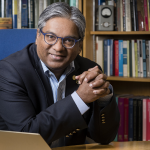

Institute for Sustainability people
The Institute for Sustainability brings together a transdisciplinary network of social and natural scientists, technologists, and non-academic stakeholders in the public, private and third sector.
Take a look at the team responsible for leading and growing the Institute.
Meet the team

Professor Ravi Silva
Director, Advanced Technology Institute (ATI) Interim Director, Pan University Institute for Sustainability and Head of NanoElectronics Centre
Biography
Ravi Silva is a Distinguished Professor and the Director of the Advanced Technology Institute (ATI) at the University of Surrey. He also Heads the Nano-Electronics Centre (NEC), which is an interdisciplinary research activity. The ATI has over 160 active researchers working on multidisciplinary programmes with the NEC being a major research group within the institute.
Short Biography: Prof. S. Ravi P. Silva CBE FREng is a Distinguished Professor and the Director of the Advanced Technology Institute at University of Surrey. He joined Surrey in 1995 after completing undergraduate and postgraduate degrees at Cambridge University. His research interests include nanotechnology, large-area electronics and renewables, and has resulted in over 680 presentations at conferences, and over 650 journal papers. He has over 28,000 citations with an H-index of 85, and won research funding in excess of £45M. He is the inventor of 50 patents, including key patents on low temperature growth of carbon nanotubes, fabrication of high-performance large area X-ray detectors and fabrication of large area nanotube-organic solar cells. He is a Fellow of the Royal Academy of Engineering, UK and a Fellow of the National Academy of Sciences Sri Lanka. He was made a Commander of the Order of the British Empire in the 2021 Queen’s New Year Honors’ list.
An established member of the University of Surrey’s Sustainability Executive Committee, Ravi has been spearheading the institution’s drive towards Carbon Net Zero, including setting up a Surrey Solar Farm. He has led sustainability work at CAESAR, chairing a session on a Net Zero World in 30 Years and helping to draft the newest guidelines on Key Technologies Shaping the Future. He led a consortium headed by the University of Surrey to be awarded close to £3 million to help design perovskite solar cells to power wearable technologies and Internet of Things (IoT) devices in 2022.
His research has resulted in over 680 presentations at international conferences, and over 650 journal papers, Over 28,000 citations (Google Scholar), and a Google H-factor of 85. Ravi is the inventor of 50 patents, including key patents on low temperature growth of carbon nanotubes, fabrication of high-performance large area X-ray detectors and fabrication of large area nanotube-organic solar cells. He has won research funding in excess of £45M and was made a Commander of the Order of the British Empire (CBE) in the 2021 Queen’s New Year Honours’ list.
In 2016, he received a Government of Sri Lanka Presidential Award in recognition for many contributions in the field of nanotechnology. In 2018, he was elected the joint Editor-in-Chief of Wiley's Energy and Environmental Materials. He received an Honorary president letter of appointment as Honorary Director to the Zhengzhou Materials Genome Institute (ZMGI) in China in 2017. Ravi was elected to Distinguished Professorships at Surrey University in 2019, Hubei University - China (2019), Zhengzhou University - China (2018) and Chonbuk National University - South Korea (2013). He has Visiting Professorships at Dalian Technology University and Wuhan University of Technology in China.
Prof. Silva won the James Joule Medal and Award for contributions to the establishment and research on carbon nanomaterials to sustainability given by the Institute of Physics to distinguished contributions to Applied and Environment Sciences in 2018.
Since 2013-2024, he has been part of three major EU programmes to establish Organic Solar Cells and Printed Electronics as an open innovation platform in Europe with total funding in excess of €20M on SMARTONICS, CORNET and MUSICODE. From 2013-2017, Ravi helped establish the groundwork to set up a €12M EU programme for the development of pilot lines for the deposition of organic materials, with the primary application being cheap large area solar cells. Smartonics led to further EU success with CORNET and MUSICODE (2017-2024). The Smartonics Project was awarded the 1st Runner-Up for the Best EU Project in that category, in recognition of the project's potential impact, dissemination and outreach towards industry and society.
In 2015, he won the Institute of Materials, Minerals & Mining (IOM3) premium award, the Platinum Medal for contributing to materials science, technology and industry. In 2014 he was awarded a premium medal by the Institute of Engineering and Technology (IET), the JJ Thompson Medal for contributions to Electrical and Electronic Engineering. In 2011 he was awarded the Royal Society Clifford Patterson Award for outstanding contribution in the fields of carbon nanoscience and nanotechnology.
Prof. Silva is a panel member in Engineering for the REF2021 and, in 2009, was elected as a Fellow of the National Academy of Sciences Sri Lanka. He was a member of the Electrical and Electronic Panel (UoA24) for the Research Assessment Exercise (2003-2008) RAE2008, EPSRC Nanotechnology Task Force and sat (2007-2010) on the Engineering and Physical Sciences Research Council's (EPSRC) Technology Opportunities Panel (TOP). He was elected a Fellow of the Royal Academy of Engineering, UK, in 2008.
Since 2005 he has worked with the National Science Foundation (NSF), Sri Lanka to establish nanotechnology as a vehicle from which to create wealth for the nation that will allow for poverty alleviation in the country. By introducing high technology into the manufacturing base in Sri Lanka he has spearheaded a drive to introduce innovation and competitiveness into the industrial sector within the country. Prof. Silva was on the advisory board of Imprimatur Ltd. UK and the National Nanotechnology Initiative (NNI) of Sri Lanka. He spent 2008 acting as an Advisor to the Honourable Minister of Science and Technology in Sri Lanka, and helped set up the Sri Lanka Institute of NanoTechnology (SLINTec) and the Nano-Science Park NANCO (private) Ltd. He acts as an advisor to both these activities and sits on the director board.
He was elected a Fellow of the Royal Society of Arts in 2007, the same year he was the runner-up of the "Times Higher Education Young Scientist of the Year", and was awarded "Most Entrepreneurial Scientist 2007, United Kingdom", by UKSEC and Science Alliance of the Netherlands. In 2005, the Nano-Electronics Centre was a finalist in the Emerging Technologies category of the IEE 2005 Awards for Innovation in Engineering, just one year after Prof. Silva received a SRIF award for £4M to set it up, enabling multidisciplinary research and allowing the enhancement of nano-bio activities via the EU Sensation and EU Carbio programme.
The largest EPSRC Portfolio award was awarded to Prof. Silva and his team in 2003 for £6.68M for Integrated Electronics which examined nanoscale design features on the optical and photonic device properties. In 2003 he was also awarded the Albert Einstein Silver Medal and Javed Husain Prize by UNESCO for contributions to electronic devices and was awarded the IEE Achievement Award. In 2002 he was awarded the Charles Vernon Boys Medal by the Institute of Physics.
Ravi's secondary education was in Sri Lanka, after which he joined the Engineering Department at Cambridge University for his undergraduate and postgraduate work. He was a recipient of Cambridge Commonwealth Trust Fellowship while at Cambridge and member of Clare College.

Professor Amelia Hadfield
Director, CIFAL Surrey. Co-Director of the Institute for Sustainability. Associate Vice-President for External Engagement. Founding Director, Centre for Britain and Europe.
Biography
Amelia joined the University of Surrey in January 2019 as Head of the Department of Politics, and Chair in European and International Affairs. Previously she worked as Director of the Centre for European Studies (CEFEUS), a Jean Monnet Centre of Excellence at Canterbury Christ Church Uni (2013-2018), after positions in Brussels at the Vrije Universiteit Brussels and the Institute for European Studies, where she directed the Euromaster degree, as well as the Educational Development (EDU). Amelia is a long-standing Jean Monnet Chair in European Foreign Affairs, allowing her to successfully obtain Erasmus+ funding for the University of Surrey’s Centre for Britain and Europe (based in the Department of Politics), establishing it in 2020 as a Jean Monnet Centre of Excellence. Amelia’s researching, teaching, consulting & postgrad supervising covers a wide range of areas on EU foreign and security policy, as well as new forms of EU-UK relations. These include Common Foreign and Security Policy, Common Security and Defence Policy, EU-US and EU-Canada relations, EU-Russia relations, EU Neighbourhood Policy, EU Development policy (with a focus on sub-Saharan Africa), as well as Arctic & northern governance issues. Additional areas of interest include foreign policy analysis, international and diplomatic history, the role of sovereignty in political history, International Relations theory, international political economy, public policy analysis, the Commonwealth and EU education policy. Amelia is regularly called upon as a guest speaker, external supervisor, research partner, consultant and media pundit on areas of EU foreign affairs, and of late, EU-UK relations. In January 2021, Amelia was appointed Dean International of the University of Surrey, leading the International Engagement Office in supporting the strategic goals of the university on partnership with other universities and networks world-wide, enhanced cutting-edge research cooperation, as well as staff/student mobility. From October 2023, Amelia was appointed Associate Vice-President of External Engagement, helping to deliver the University of Surrey’s international strategies, alongside community engagement, public affairs, and developing new partnerships at local, regional, national and international level.
In December 2024, as a result of her work with UNITAR, the UN’s research and capacity building agency, and complementing her role as Co-Founder and Co-Director of the Centre of Excellence on Ageing (April 2023), Amelia was appointed inaugural Director of the CIFAL Surrey Centre, a knowledge exchange hub based within the Institute for Sustainability, dedicated to training and capacity building climate literacy, climate leadership and sustainability more broadly.

Professor Prashant Kumar
Co-Director of the Institute for Sustainability (Faculty of Engineering and Physical Sciences)
Biography
Prof Kumar is a founding Co-Director of the pan-university Institute for Sustainability, Professor & Chair in Air Quality and Health, and founding Director of the internationally-leading research centre Global Centre for Clean Air Research (GCARE) at the University of Surrey, UK. He is the founder of successfully running Guildford Living Lab, a Trustee at Zero Carbon Guildford (ZERO), an Adjunct Professor at Trinity College Dublin, Ireland; and a Guest Professor at Southeast University, China.
He joined the Senior Leadership team of the Faculty of Engineering and Physical Sciences as an Associate Dean (International) in 2020 and subsequently took up another senior leadership role to help setup the new pan-University Institute for Sustainability as a founding Co-Director in 2023. As an Associate Dean (International), he worked on implementing the University's Global Strategy and provided leadership to the international agenda, including student recruitment, transforming the PGR international placements through Turing and other mobility schemes, building several successful international research partnerships, coordinated numerous UG and PGT partnerships and joint PhD programmes, and led the QS submission for the University as a 'QS Impact Champion'.
Earlier, he served as a Reader (2015-2017), Senior Lecturer (2012-2015) and Lecturer (2009-2012) before promoting to Chair and Full Professor of Air Quality and Health (2017-) at the University of Surrey. He was the Deputy Director of Research for the Department of Civil & Environmental Engineering during 2018-2021.
An engineer by training, Prof Kumar obtained his PhD (Engineering) from the University of Cambridge (UK) after winning a Cambridge-Nehru Scholarship and Overseas Research Scholarship award. He earned his Master's Degree in Environmental Engineering & Management from the Indian Institute of Technology, Delhi, where he won the ‘Outstanding Postgraduate Student Award’ for his exemplary performance (CGPA 9.8/10 and rank 1). Prior to his PhD, he worked in the construction industry and a CSIR Research Institute for about 7 years.
Prof Kumar has won numerous prizes and awards in recognition of his academic and research excellence throughout his study and academic career. Consequitively in 2022 and 2023, he was bestowed with the global accolade of being recognised in the top 1% of ‘Highly Cited Researchers’ by Clarivate. The award reinforces Prof. Kumar’s ‘significant and continued broad’ contribution across scientific fields as one of the world’s top-cited researchers in Web of Science. He was the winner of the University of Surrey’s Vice-Chancellor award ‘Researcher of the Year’ in 2017. His research on air pollution reduction through green infrastructure earned him the 2023 Haagen-Smit Prize for Best Paper.
Professor Kumar was honoured by the California Air Resources Board with the prestigious 2023 Haagen-Smit Clean Air Award - an accolade regarded as the 'Nobel Prize' for air quality achievements - for his "transformative contributions, widespread impacts, novel accomplishments, and exceptional leadership and achievements in this field".
His fundamental and application-oriented cross-disciplinary research is focused on the interfaces of clean air engineering, human health and smart/sustainable living in cities/megacities. His current research projects are focused on broad multidisciplinary areas of air pollution monitoring/modelling, low-cost sensing, nature-based solutions, climate change mitigation and developing innovative technological and passive (e.g. green infrastructure) solutions for air pollution exposure control for both developing and developed world. He is currently the lead PI on the UKRI (EPRC, NERC, AHRC) funded RECLAIM Network Plus.
In response to the global public health crisis, Prof Kumar played an active role in the clean air community. He participated in the Royal Society Rapid Assistance in Modelling the Pandemic (RAMP) volunteer initiatives and was part of an international effort making a case to the WHO for the recognition of airborne transmission. Among others, his team studied the impact of lockdown on air quality in different cities, including ODA countries, and how different types of face masks can offer protection from the infection of SARS-CoV-2 in public built spaces.
A prolific author with over 400 journal articles (and the same number of conference presentations and articles), his research has attracted over 27,000 citations, with an h-index of 80 (i10-index, 338). These include several highly downloaded, cited and almetrics articles, new directions around air quality challenges, wood burning, climate change and cities, and agenda-setting papers in the area of low-cost sensing, green infrastructure design, ultrafine particles, non-exhaust emissions, smart homes, nature-based solutions and particles and policies.
He has secured over £14M of individual research funding from projects total worth over £30M, funded by the RCUK (e.g, EPSRC, ESRC, NERC, AHRC, MRC, HEFCE, British Council, Innovate UK, Research England, GCRF), industry, international funding bodies (e.g., European Commission, Qatar National Research Foundation, Commonwealth Commission, FAPESP) and charities (e.g. Ove Arup Foundation, RSA, Impact on Urban Health, Global Action Plan).
He serves on editorial boards of several international journals (e.g. Scientific Reports) and scientific evaluation panels of numerous funding agencies. He is Editor-in-Chief of the air quality section of the ‘Atmosphere’ journal (since July 2020) and founding Speciality Chief Editor of the ‘Climate Change & Cities' section of Frontiers in Environmental Science journal. He serves the editorial board of several reputed journals (e.g. Scientific Reports) and is Editor-in-Chief for the ‘Atmosphere’ journal (since July 2020) and founding Speciality Chief Editor of the ‘Climate Change & Cities' section of Frontiers in Environmental Science journal.
He is a reviewer and advisor to scientific evaluation panels of numerous funding agencies in the UK (e.g. NERC, EPSRC) and outside (e.g. Austrian Science Fund) and sits on the scientific advisory board of a number of companies. He advises local councils, and national and international governmental bodies on air pollution and urban nexus.
He has developed a network of collaborators across four continents. His research has featured regularly in well-read media outlets such as the BBC and The Times. Further information on his work can be found on the GCARE website.

Professor Monique Raats
Co-Director of the Institute for Sustainability (Faculty of Health and Medical Sciences)
Biography
I am a founding Co-Director of the University's Institute for Sustainability, and director of the Food, Consumer Behaviour and Health (FCBH) Research Centre. Together with the university’s Department of Nutritional Sciences, FCBH was awarded the prestigious 2017/2018 Queen’s Anniversary Prize. FCBH research domains include:
- food-related behaviour and policy interventions to achieve sustainable and healthy lifestyles;
- social, policy and ethical issues relevant to the grand societal challenges such as sustainability and obesity;
- study of food systems from the perspective of significant actors and stakeholders within the system; and
- methodologically advancing food consumer science through exploring novel data sources and methods of data linking.
I previously worked at the Institute of Food Research (now Quadram Institute), Health Education Authority and University of Oxford. My expertise is in the area of public health and behavioural nutrition research, gained on a variety of projects. My research is wide ranging both in terms of topics covered (e.g. food choice, policy development, food safety) and methodologies used (e.g. qualitative, quantitative, stakeholder consultation). I have also been involved in the evaluation of health promotion programmes and developing tools for use in nutrition education. To date I have published over 145 refereed papers, numerous non-refereed publications including 20 book chapters 20 book chapters and have edited two books ("The Psychology of Food Choice" (2006) and "Food for the Ag(e)ing Population" (1st edition 2009; 2nd edition 2016).
From 2011 until June 2018 I was a member of UK's Scientific Advisory Committee on Nutrition (SACN) and also a member of the Subgroup on Maternal and Child Nutrition (SMCN) from 2012 until June 2018.
I am one of the founding members, member of the Board of Directors (2001-2006) and was secretary (2004-2006) of the International Society of Behavioral Nutrition and Physical Activity. The society was set up to combine interests in diet and physical activity; and to stimulate, promote and advocate innovative research and policy in the area. The society now plays an important role in fostering excellence in research in this field through its annual meetings and journal called the International Journal of Behavioral Nutrition and Physical Activity.

Dr Tom Roberts
Co-Director of Institute for Sustainability (Faculty of Arts, Business and Social Sciences)
Biography
I am a founding Co-Director of the University's Institute for Sustainability, and Senior Lecturer in Environmental Sociology, in the Department of Sociology. My research focuses on the relationship between people and the environment. More specifically I am interested in the impact of climate change on everyday life, healthcare and crime; public perceptions and understanding of environmental change and new low carbon technologies; the challenges associated with transitioning to a low carbon society, particularly in relation to work and skills; the environmental impact of consumption and waste disposal practices. My research has been funded by The British Council; The British Academy; Public Health England; The Economic and Social Research Council; The Engineering and Physical Sciences Research Council.

Dr Zoe Harris
Director of the Centre for Environment and Sustainability, Co-Director of the Institute for Sustainability
Biography
Zoe’s core research focuses on how we can use land to provide food and energy provisions whilst minimising environmental impacts. She is currently assessing the feasibility of vertical farming and the potential it has to support the deployment of Bioenergy with Carbon Capture and Storage (BECCS).
Zoe leads the high profile Taeda Tech Project, a £4m interdisciplinary demonstration project looking at using a novel aeroponic technology to rapidly multiply biomass feedstocks. She has also recently kicked off the Vertical Farming to Improve UK Food System Resilience (VF-UKFSR) project assessing how vertical farming can increase UK food system resilience.
Beyond Surrey, Zoe has a significant international profile with notable positions in the International Energy Agency Bioenergy Technology Collaboration Programme. Representing the UK, Zoe is Head of Communications of the IEA Bioenergy Executive committee. Zoe also acts as the National Task Lead for the UK for Task 45 In this role she represents the UK research landscape and develops collaborative research for “Climate and Sustainability Effects of Bioenergy within the broader Bioeconomy”.
Zoe also has interests in the role of gender in the energy sector and is founder of the IVUGER network, which aims to support women and BAME women in UK energy research. She has undertaken work into the role of job advert wording on applicant diversity and has a new project assessing the role of diversity in decisions making for transport decarbonisation in Bradford.
Zoe is a keen science communicator and professionally trained actor. She uses her theatre training to deliver workshops on how scientists can better communicate their research.
Prior to joining CES, Zoe was a Research Fellow, and Research Associate, at the Centre for Environmental Policy, Imperial College London. She has worked in DEFRA as a Science Officer assessing GHG mitigation options for agriculture, and in BEIS and DfT as a Policy Adviser on the EU Emissions Trading System (ETS). Zoe completed her PhD and BSc Biology at the University of Southampton.
Dr Roberta Discetti
Lecturer in Sustainability
Biography
Roberta Discetti is an interdisciplinary researcher in the field of sustainability and business ethics. Roberta has a background in philosophy (BA and MA), environmental communication (MA), and business ethics (PhD). At the University of Surrey, Roberta is the Research and Training Manager at UNITAR CIFAL Surrey Centre and the Programme Leader for the MSc Sustainable Development in Practice within Surrey Online Learning.

Nathalie Hinds
Director, Institute Operations, Innovation and Partnerships
Biography
Nathalie is responsible for leading the operational initiatives for the Institute such as communications, team structure and financial management, as well as creating strategic relationships with external organisations and facilitating knowledge exchange and innovation activities.

Dr Damiete Emmanuel-Yusuf
Research Fellow in Sustainability Transitions, Institute for Sustainability
Biography
Damiete’s role as the research fellow for transitions is to provide support for the establishment and operations of the institute’s research programmes, facilitate interdisciplinary research by coordinating the activities of the sustainability fellows within and across programmes and collaborating on relevant research calls. She also applies her research expertise in response to research requests from the institutes’ external partners and is working on the development of a research portfolio based on sustainability transitions.
Damiete Emmanuel-Yusuf has a background in Environmental Management/Biological Sciences with a PhD in Environment and Sustainability. She started her career as an environmental consultant with leading environmental consultancies including the Environment Agency.
Her research/teaching career began in 2008 at the Centre of Environment and Sustainability, University of Surrey. As a researcher, Damiete has worked in the areas of sustainable energy system analysis, environmental management, sustainable development assessment and social research on sustainability, for a number of projects including the TSEC-BioSys project (Natural Environmental Research Council), Decentralised Poly-generation of Energy (Engineering and Physical Sciences Research Council), The Transitions Pathways to a Low Carbon Economy and the Realising the Transitions Pathway to a Low Carbon Economy projects (EPSRC and EON UK) and more recently EnergyREV funded by the industrial Strategy Challenge Fund’s Prospering from the Energy Revolution (PFER) programme.
In addition, she has contributed to teaching Masters degree modules such as 'Transitions to Low Carbon Economy' as well as 'Corporate, Social & Environmental Responsibility' at the Centre for Environment and Sustainability, University of Surrey.




Pina Stamp
Institute Administrator

